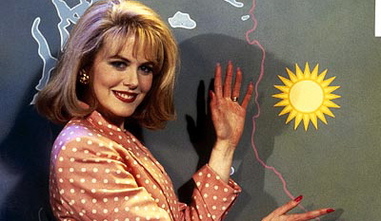Gus Van Sant's merges the femme fatale with the mockumentary style to great success in the darkly funny To Die For. Having seen two thirds of his Death Trilogy and the equally languid Paranoid Park, this tightly wound, expertly paced crime story was not what I expected from the artistic-verging-on-pretentious indie director of the mid-2000's. Early Van Sant is a surprising amount of fun, though Drugstore Cowboy probably begs to differ.
To Die For begins with its anti-heroine Suzanne Stone-Maretto (Nicole Kidman, rarely better) in the center of a murder trial that has ballooned into a tabloid circus. She is the first to directly address the camera in confessional-style interviews, but the other principles will all get their turn. Van Sant flits back and forth between the aftermath of the crime and the media interest it generates, and the events leading up to it.

Kidman is fantastic in the lead. Suzanne Stone-Moretto is one of her better performances, and possibly the one that marked her as a seriously-talented actress. She plays the character as a mediocre actress, able to fool most but not everyone. The kind of attention hog that will pass off a catered meal as one she prepared personally, Suzanne has a picture in her head of what her life will be and she will live it no matter what. Van Sant never shows her with a hair out of place, even keeping her guard up in the interview segments that are ostensibly her directly addressing the viewer. Lance falls at her feet, as do the high schooler's. Of those three, Phoenix's Jimmy, sub-verbal and dog-like, and Folland's Lydia spar for her attention. Where Jimmy sees a love interest, Lydia sees someone who can make her feel important. Both young actors invest their roles with a healthy dose of pathos, signaling big things to come in Phoenix's future and a disappointingly short resume for Folland. The only person to see through Suzanne is Lance's sister Janice, played with eye-rolling cynicism by Illeana Douglas. As the film's truth-teller, Janice gets plenty of great moments, including a show-stopping final scene that continues over the credits.
As a herald of Nancy Grace-style crime TV and general fame-seeking behavior, To Die For is fairly prescient. Adapted from a book that was inspired by the first trial to be televised, it does an excellent job satirizing the kind of talk shows the that would be interested in every sordid detail of the plot. The film also came out in the middle of the OJ Simpson trial, though its meager box office implies that the public was either too enraptured by a real trial-of-the-century to entertain itself with a fake one, or were just exhausted by it. On the other hand, if the movie took place 15 years later, Suzanne would've felt right at home on reality television, though whether or not she would auction her dignity off in that fashion is an open question. At one point in the film, Suzanne says, " What's the point of doing anything worthwhile if people aren't watching?" A motto for Bachelor and Bachelorette alike if there ever was one, the selfie-stick toting public might also nod in agreement. B+
 RSS Feed
RSS Feed